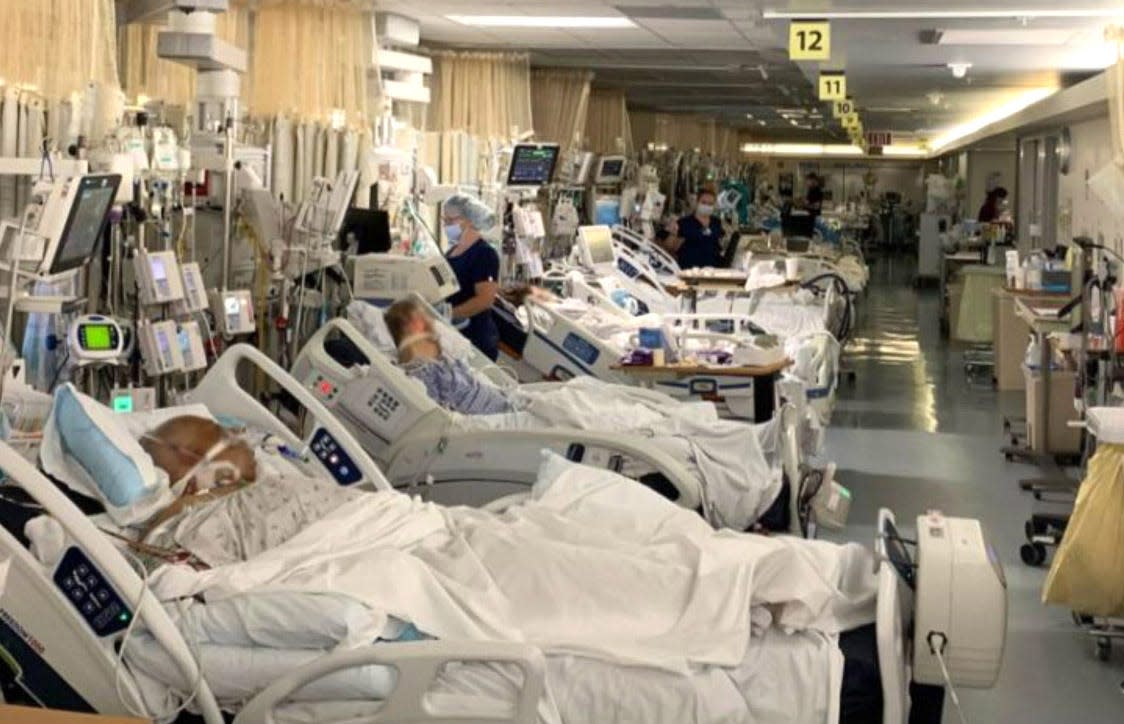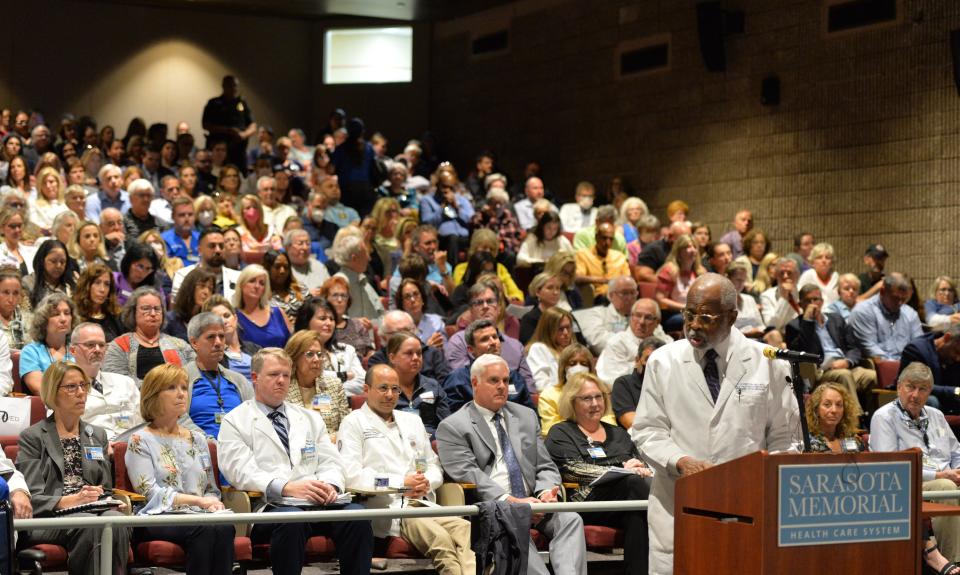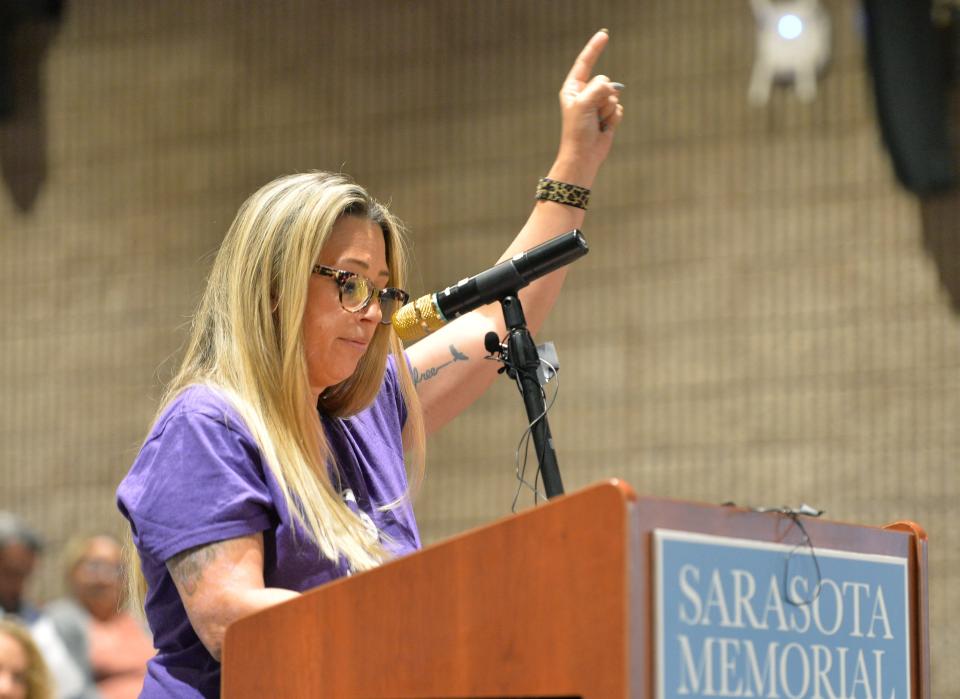COVID-19 response: Sarasota Memorial Hospital had better than anticipated survival rate

- Oops!Something went wrong.Please try again later.
Sarasota Memorial Hospital received high marks from a review of its handling of the COVID-19 pandemic, with fewer deaths and shorter stays by patients than most other facilities in Florida and nationwide. But the findings did not quell criticism from some people who said they had lost trust in the public hospital over the hospital's adherence to medical protocols and policies isolating patients from loved ones for much of the pandemic, while others expressed admiration for heroic work under trying circumstances.
In the end, the board that oversees the region's dominant health care provider, the Sarasota County Public Hospital Board, adopted recommendations from the COVID performance study by a 7-2 vote Tuesday, with the two no votes coming from board members elected last fall after campaigning on a platform largely centered on criticism of Sarasota Memorial's handling of the pandemic.
Earlier:COVID-19 concerns drive conservative effort to win seats on Sarasota Hospital Board
Hospital Board:Sarasota Memorial Hospital's COVID protocols to be investigated after emotional meeting
The recommendations included the formation of a Health Emergency Response Committee modeled after the hospital's COVID treatment task force; continued development of post-hospital and home-health services; increased staffing and use of technology to improve communication; development of an outreach and education plan for the public; and a clearer line of communication for “stakeholders” to communicate both by name and anonymously with medical leadership and the hospital board.
Board members Bridgette Fiorucci and Victor Rohe – two of the three new members who won seats on the board after running on a "Health Freedom” platform in last year's election − voted against the approval. The third member, Patricia Maraia, who was vice-chair of the committee chaired by fellow hospital board member Britt Riner, voted for adoption.
“We took the sickest of the sick from other hospitals and turned no one down," Riner said, referring to the hospital's performance during COVID.
Fiorucci, who expressed dismay about fliers left out in a physicians' lounge urging a packed attendance to support the hospital at the board meeting, was concerned with the pushback against those who questioned “the narrative” of the established guidelines to treat COVID-19.
“Not all physicians here – at least the ones that I have spoken to – share your level of disdain for the lovers of medical freedom,” Fiorucci said. “However most of them are afraid to speak out because they are afraid of losing their livelihood.”
Rohe favored releasing the report and its finding as a draft subject to public review and recommendations prior to adoption.
Since the start of the COVID-19 pandemic, Sarasota Memorial Hospital has provided care to roughly 70% of all patients hospitalized in Sarasota County. Between April 1, 2020, and Sept. 30, 2022, the hospital’s COVID mortality rate was 24% better than national benchmarks, according to an independent analysis conducted as part of an internal examination of the hospital’s handling of the pandemic.
The report was generated by the hospital’s Quality Control Committee following a heated Nov. 29, 2022 board meeting, the first for the newly elected board members who had criticized the hospital's COVID performance in their campaign. Some speakers at the meeting raised concern about being denied access to loved ones because of COVID-19 isolation practices and voiced complaints about the perceived refusal by the hospital to incorporate the off-label use of medicines such as Ivermectin and Hydroxychloroquine as part of their treatment.
Board member Brad Baker expressed satisfaction with the report.
“Any doctor that wanted to prescribe Ivermectin or any medical treatment that they thought was best for their patient, was not blocked by the hospital,” Baker said, referring to a controversial medication. “I think that’s important; in fact, some of the speakers who were physicians actually recently used those medical treatments – so there was no conspiracy or blocking by administration of what the protocol was for a specific physician.”
Baker also said he was satisfied that employees were able to choose not to be vaccinated.
“It did work because a lot of employees did not get vaccinated and did not lose their job – no one lost their job for that,” he added.
According to the report, more than 7,500 employees were vaccinated, while about 1,100 employees received an exemption.
Riner said that in the last two-and-a-half years she has suffered a lot of loss, too.
“We all are grieving in different ways over the last three years,” Riner said then, added that her dad died without being able to hold his granddaughter because of pandemic restrictions.
“I am proud of this report and I believe it speaks for itself and I encourage each of you to read it for yourselves," she later added.
Study details
To determine the effectiveness of Sarasota Memorial’s response to COVID-19, the hospital contracted with Premier Inc., an independent quality control consultant that compared SMH with 1,300 hospitals it tracks across the nation, as well as peers within the state and other similarly-sized hospitals across the nation.
The study covered the period from the spring of 2020 through last fall. It covers in-patients age 18 and older who were admitted with a primary or secondary diagnosis of COVID-19.
During the study period, SMH medical personnel treated 6,410 adult patients. More than 90% – 5,833 – were discharged safely after treatment while there were 577 COVID-related deaths.
In addition to the main report, a hospital committee reviewed nine specific cases of how patients were treated. Because of time constraints, only five were selected by Hospital Board Chairman Tramm Hudson for a detailed review in a closed session Tuesday morning. The panel concluded that all nine met the hospital’s standard for care.
The full study should be available online at www.smh.com.
The report noted that because COVID-19 was a new virus, protocols for treating patients were constantly evolving for most of the pandemic's first year.
Dr. Washington Hill, an obstetrics and gynecology expert underscored that during public comment.
“We learned as things progressed, instituted best practices – some from other institutions and some we then shared with other institutions throughout the world,” he said. “Please hear me clearly: The nurses, physicians and employees risked their lives of their family to care for the community and still do.”

Jennifer Cottrell was one of several people who questioned the validity of a study conducted in-house – even with an external company crunching the data.
“It’s time to stop the horse and pony show and get a proper investigation done,” Cottrell said. “It’s time to assign this to a special committee other than your internal quality committee to perform an internal and thorough investigation.”
Michelle Bakondy later applauded the board for having Premier gather data on the hospital’s performance then added, “Where’s the third-party investigation?
“You’re halfway there, give us the whole way.
“This institution needs community support,” she later added. "I know you’re building a big one in North Port – if you think our North Port residents are going to put up with this crap, you’ve got another thing coming.”
A matter of politics
While some residents called for an outside investigation, hospital officials and medical professionals expressed weariness of what they saw as a ramping up of politics.
Hill said that, "If this hospital is to continue as a first-class center of excellence, seeing all of the community, we must stop the bickering and politics and listen to those who know.”
Riner was more direct. “Interestingly enough no one came to our meetings – our committee meetings or our public board meetings until June of 2022," Riner said. "The pandemic started in March of 2020; just keep that in mind."

As for concerns about vaccine safety and national medical protocols, she stressed that the hospital board was the wrong forum for those complaints.
“That is not within our purview. You don’t go to your congressman to ask for a new playground in your hometown," Riner said. "Please contact your federal representatives to take these worthy fights to the right locations.”
This article originally appeared on Sarasota Herald-Tribune: Sarasota Memorial Hospital COVID-19 survival rates exceeded benchmarks

